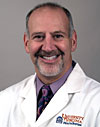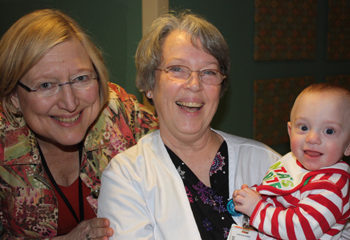Ever wonder what your doctor or health provider does outside the exam room? Our 7 Quick Questions series gives you a personal glimpse into the people of UVA.
 Robert Sinkin, MD, MPH, is medical director of UVA’s neonatal intensive care unit and the Newborn Emergency Transport System.
Robert Sinkin, MD, MPH, is medical director of UVA’s neonatal intensive care unit and the Newborn Emergency Transport System.
What did you want to be when you were little?
I have distinct memories of wanting to be a math professor at a college. Prior to puberty, I wanted to be a singer but my voice didn’t fare well when I started to shave.
Where’s your favorite place to travel?
A beach destination — I miss the ocean and the waves, having grown up on Long Island. Any warm tropical climate that has a sandy beach requiring suntan lotion and frequent thirst-quenching interventions will do.
What’s one thing you always have in your fridge?
Bold Rock Hard Cider — Virginia Draft variety.
What’s the most unhealthy thing you eat?
Jellybeans. All flavors and varieties, although licorice is my least favorite. A close second favorite candy is Goetze Caramel Creams.
What’s the most exciting thing/research happening in your field right now?
Non-invasive physiologic monitoring. By utilizing the many streams of data being collected from the bedside, including heart rate and rhythm, respiratory pattern and oxygen saturation levels, efforts are being made to develop algorithms that may provide early warning that a baby is developing an infection or one of several other complications common in the neonatal intensive care unit related to his/her prematurity or underlying illness.
These data are readily available, downloaded from the cardiopulmonary and oxygen saturation monitors to which our patients are routinely connected. From these data, complex mathematical models that correlate with clinical outcomes are derived in the form of a readily available index score at the baby’s bedside.
Why babies?
Once I was convinced that the field of pediatrics suited my personality, I found the fast-paced, intensive care and procedure-driven aspects of neonatology best aligned with my desire to work in a field that offered promise of cutting-edge science and discovery both in the laboratory and in the clinical arenas. Translational research at its finest.
Who’s your inspiration/hero?
In childhood, Superman of comic book fame occupied my fantasy life.
In reality, I had excellent role models and mentors within the field of neonatology. As a trainee and junior faculty member at the University of Rochester, Don Shapiro taught me how to balance science, curiosity and medicine with one’s home life. Through his tutelage, I had firsthand experience in the cutting-edge science of surfactant replacement therapy for premature babies while facing attendant ethical and moral challenges inherent in caring for babies born on the cusp of viability. (Gestational age limits have continued to decrease as our discoveries within the field have given us the technology, medications and appreciation for the developmental aspects of interventions allowing extremely premature babies not only to survive but to achieve normal outcomes.)
At the University of Virginia, I have had the great privilege of working with John Kattwinkel, a pioneer in the field of neonatology. John’s discoveries in the field of pulmonary physiology with the use of CPAP and surfactant, along with his leadership on the national stage in the “Back to Sleep” program, which led to a significant decrease in the incidence of SIDS, to name a few efforts, have been inspirational.

